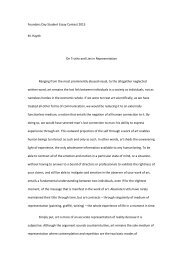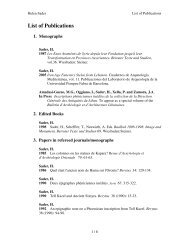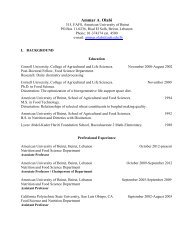The IX t h Makassed Medical Congress - American University of Beirut
The IX t h Makassed Medical Congress - American University of Beirut
The IX t h Makassed Medical Congress - American University of Beirut
You also want an ePaper? Increase the reach of your titles
YUMPU automatically turns print PDFs into web optimized ePapers that Google loves.
NUTRITION IN INFLAMMATORY BOWEL DISEASE<br />
Dominique Turck MD<br />
Children represent 10-15% <strong>of</strong> cases <strong>of</strong> Crohn’s disease (CD), mainly arising after the age <strong>of</strong> 10, i.e.<br />
during puberty. Thus, it is not surprising that malnutrition, impaired growth and pubertal delay<br />
are major complications <strong>of</strong> pediatric CD. Decreased oral intake, malabsorption and increased<br />
needs and losses in energy and nutrients are major determinants modulating nutritional status<br />
and growth. A deleterious effect on growth <strong>of</strong> corticosteroids has also been shown. Impaired<br />
growth or altered growth velocity may precede the occurrence <strong>of</strong> clinical symptoms <strong>of</strong> CD. At<br />
diagnosis, weight loss and growth delay are present in 80-90% and 1/3 <strong>of</strong> cases, respectively.<br />
No diet has been shown as efficient in the maintenance <strong>of</strong> remission. Exclusive enteral nutrition<br />
(EN) for 6-8 weeks should be the first choice for the treatment <strong>of</strong> a flare-up. Prolonged nocturnal<br />
EN can be helpful for the treatment <strong>of</strong> growth retardation and in case <strong>of</strong> steroid-dependent<br />
or steroid-refractory CD. However, immunomodulating (azathioprine, 6-mercaptopurine,<br />
methotrexate) and biological agents (infliximab, adalimumab) are nowadays an efficient<br />
alternative to prolonged nocturnal EN in most patients with active disease. Efficacy <strong>of</strong> polymeric<br />
solutions is identical to that <strong>of</strong> semi-elemental or elemental solutions. Parenteral nutrition is<br />
limited to a flare-up with resistance to medical treatment and/or EN, and contraindications<br />
to surgery; occlusion or fistula; short bowel syndrome. At diagnosis <strong>of</strong> ulcerative colitis (UC),<br />
weight loss and growth delay are present in 50% and 5-10% <strong>of</strong> cases, respectively. As opposed<br />
to CD, nutritional therapy can not be used per se to treat a flare-up <strong>of</strong> UC.<br />
NUTITION IN INFLAMMATORY BOWEL DISEASE<br />
Dominique Turck MD<br />
Life expectancy for patients with cystic fibrosis (CF) has steadily improved during the last 3 decades,<br />
and death in childhood is now uncommon. Nutrition is a critical component <strong>of</strong> the management<br />
<strong>of</strong> CF, and nutritional status is directly associated with both pulmonary status and survival. Expert<br />
dietetic care is necessary, and attention must be given to ensuring an adequate energy intake<br />
in the face <strong>of</strong> demands which may be increased by inadequately controlled malabsorption,<br />
chronic broncho-pulmonary colonisation by bacteria and fungi, exacerbations <strong>of</strong> acute lung<br />
infection, impaired lung function, and the need for rehabilitation, repair and growth.<br />
Pancreatic enzyme replacement therapy (PERT) is needed by up to 90% <strong>of</strong> CF patients in Northern<br />
Europe, but a smaller proportion in Mediterranean countries and elsewhere. Complications <strong>of</strong> CF<br />
including liver disease and CF-related diabetes pose further challenges. In addition, deficiency<br />
<strong>of</strong> specific nutrients including fat soluble vitamins (particularly A, E and perhaps K) essential fatty<br />
acids and occasionally minerals occur for a variety <strong>of</strong> reasons. Osteopenia is common and poorly<br />
understood. Liver disease increases the likelihood <strong>of</strong> vitamin D deficiency.<br />
Glucose intolerance and diabetes affect at least 25% <strong>of</strong> CF adults, and the diabetes differs from<br />
both types 1 and 2 diabetes mellitus, but it inversely correlates with prognosis. Management<br />
consists <strong>of</strong> anticipating problems and addressing them vigorously as soon as they appear.<br />
Supplements <strong>of</strong> vitamins are routinely given. Energy supplements can be oral, enteral or, rarely,<br />
parenteral. All supplements, including PERT, are adjusted to individual needs.<br />
55
















